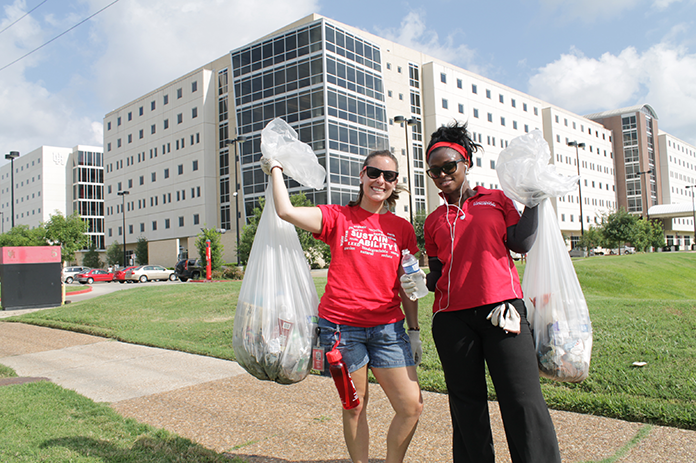Sustainable Living Resources
Living sustainably can help improve overall wellness, decrease financial expenditures and facilitate a mutually beneficial relationship between ourselves and the natural environment. Reference the resources below to begin leading a more sustainable life!

Minimize waste
- Recycle: The City of Houston operates 6 neighborhood recycling centers. The city accepts paper, plastics #1-5 and 7, aluminum, cardboard, and glass (UH
does NOT accept glass). All products should be rinsed and drained before recycling.
Broken electronics and other unique items can be taken to the Westpark Consumer Recycling Center, CompuCycle, or Bass Computers.
- What Can Be Recycled? An A-Z List - Instructions for recycling over 200 items
- Print double-sided or don’t print at all: You can reduce printing by storing files electronically and going paperless when possible.
- Shop at and donate to second-hand stores: You can find unused and used clothes at low price to you and the environment. If you have quality clothing that you aren’t using anymore, be sure to give it to a friend or donate it to a thrift store.
- Choose reusable over disposable items: Bring reusable containers and bags when packing lunches, traveling and shopping. Choose silverware over plastic utensils. Fill up your reusable water bottle at the many UH2O refill stations on campus.
- Compost: According to the EPA, food scraps and yard waste currently make up 20 to 30 percent
of what we throw away. Most food scraps can be composted instead. Compost is organic material that can be added to soil to help plants grow.
Compost can be better than traditional soil because of its beneficial microbes. Composting requires three basic ingredients:
- Browns: This includes materials such as dead leaves, branches, and twigs.
- Greens: Grass clippings, vegetable waste, fruit scraps, and coffee grounds.
- Water: Having the right amount of moisture is important for compost development.
Utilize alternative transportation
According to the Department of Energy, highway vehicles release about 1.7 billion tons of greenhouse gases into the atmosphere each year, which contributes to climate change. By utilizing alternatives, you can help reduce your carbon footprint.
- Participate in COAST: Coogs on Alternative and Sustainable Transportation offers incentives for UH community members with multiple transportation options to and from campus:
- Carpooling incentives include priority parking spaces and discounted permit rates.
- METRO (The Metropolitan Transit Authority of Harris County) offers over 60 bus routes as well as a vanpool program and METRORail. Order a Q-Card online through your PeopleSoft account.
- Bike to school and make sure to register your personal bike. Houston BCycle is a bike share service with many stations on and around the UH campus.
- Zipcar offers car rentals at a discount to UH students, faculty, staff, and alumni, with three pick-up/drop-off locations on campus.
Eat sustainably
- Reduce meat consumption: Animal agriculture contributes to many detrimental environmental effects such as deforestation, soil erosion, nutrient runoff, water waste, and greenhouse gas emissions. Look for symbols on food that categorize it as Vegetarian, Vegan, or Plant-Based. UH Dining offers many vegan and vegetarian options.
- Shop at farmers markets: By shopping at farmers markets, you are directly supporting local agriculture. Seasonal produce sold at farmers markets has fewer "food miles." Urban Harvest and other organizations host recurring farmers markets in the city. UH also hosts farmers markets on the second Wednesday of each month.
- Read labels: Foods that contain many ingredients usually include preservatives and additives, which can be harmful to your body and the environment. Be sure to read nutrition labels before making purchases in order to make the best choice for you.
- Grow your food: Even in very small spaces, you can make room for container gardens. This ensures that you know the direct source of your produce. Growing produce at home also limits packaging that often ends up at landfills.
Conserve energy at home, work and school
- Avoid phantom electricity drains: Unplug electrical devices when you’re not using them.
- Use natural lighting: Utilize natural sunlight for interior illumination.
- Shut your computer down or put it to sleep: By using power management features you can save up to $75 every year on your electric bills and conserve energy.
- Use a “smart” power strip: It shuts down the electricity flow to electronics on standby mode.
- For more usefull tips, see this Homeowners Guide to Sustainability and UH's Holiday Energy Tips.
Save water
- Turn off the tap: While brushing your teeth or shaving, don’t let the water run.
- Run your dishwasher when it’s full: Maximize the use of the energy and water with a full load of dishes.
- Keep showers short: About 75% of the water used in most homes can be traced to the bathroom. A two minute reduction in your daily shower time can save more than ten gallons of water.
- Only wash full loads of laundry: Make sure you are washing full loads of laundry in cold water only. Most of the energy goes into heating up the water to wash your clothes.
Choose sustainably-produced commodities
When purchasing items keep a lookout for: